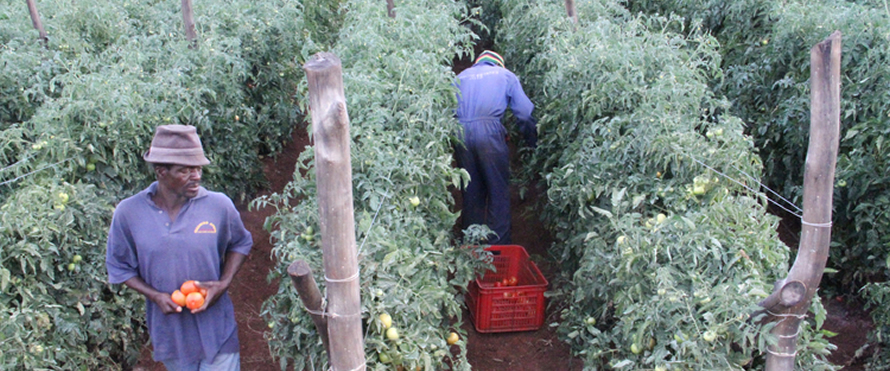
The Sunday Mail

In-Depth Reporter
A revolution is sweeping across the agricultural sector with a new “breed” of youthful and aggressive farmers taking an active interest.When the fast-track land reform programme gathered momentum in 2000, it was mostly the elderly who got land.
The majority of the country’s youths were not interested in taking an active role in farming.
Some of the youths were hoodwinked by political parties into believing that the land redistribution exercise was a political gimmick that was going to be abandoned. As a result of this misinformation, a lot of youths never bothered to apply for land.
But upon realisation of the tangible benefits being derived from farming, youthful farmers are now taking an active role in the agricultural sector.
A recent visit to tobacco auction floors by The Sunday Mail In-Depth revealed that youths were playing a pivotal role in the tobacco sector.
In Zimbabwe, the youth are those below the age of 35. The United Nations defines “youth”, as those persons between the ages of 15 and 24 years.
One of these “enlightened” youthful farmers is 23-year-old Jerry Chamboko of Ranche Estate which is located 35 kilometres west of Gweru in the Matobo area. Although Chamboko was only nine years old when the land reform exercise began, this did not stop him from realising his dream of becoming a successful farmer.
“We used to come down here (to the farm) with my father during school holidays. I developed an interest in farming when I was still in primary school,” he said.
He is currently growing tomatoes and maize at his father’s farm.
“My father was concentrating more on his other businesses and operations at the farm were compromised. Together with my brother, we decided to venture into farming since we did not want to be spoon fed by our father.”
When The Sunday Mail In-Depth visited the farm last week, Chamboko’s 10 workers were busy harvesting tomatoes.
In total, the farmer planted 10 000 plants of the Star 9009 variety and had already harvested 22 tonnes of tomatoes. The tomatoes are grown under drip irrigation.
Every week Chamboko harvests about 300 crates and vegetable vendors from the city of Gweru, where there is a ready market, are his customers.
The 9009 variety can be harvested over a period of three months.
“Vegetable vendors used to travel to Harare and Mhondoro to buy tomatoes. Now the vendors are coming here. I am, however, failing to satisfy the demand,” he said.
According to the young farmer, he invested US$6 000 in the tomato project.
“So far my sales are past the US$10 000 mark. The market is flooded but I cannot complain since I have already made my profit,” the farmer said.
When Chamboko started selling his tomatoes, the produce was selling for US$22 for 30 kilogrammes. The price has since fallen to US$9. The Midlands State University History and Development Studies graduate said it was not all rosy.
“We grew up in town and were not used to farm life. At first we only had two workers and we were forced to do much of the work ourselves. I am happy to say that I am now a hardened farmer,” he said.
He called upon farmers to prioritise crops that ensure food security.
“It makes me proud when I see people buying my tomatoes. In the meantime, I cannot grow such luxuries as green pepper but will concentrate on tomatoes, which are a necessity,” the youthful farmer said.
Chamboko said farming is his chosen career.
Mr Langton Mupeta, of Somabhula Farm in Gweru, believes that the future of the agricultural sector lies in the hands of the youths.
“There is need for the elderly farmers to pass on the baton to the youths. As you can see, I am getting old and for my farm to remain viable even when I am gone, I must make sure that I involve my children in whatever I do here,” he said.
Agriculture students from some colleges in the Midlands Province are undergoing their industrial attachment at Mr Mupeta’s farm where they gain practical farming experience.
Apart from growing maize, Mr Mupeta also runs a piggery project and is also into cattle ranching.
One of the students on attachment at the farm, Timothy Majoni (21), said he is looking forward to becoming a fully-fledged farmer.
“I learnt a lot from everyone here and I hope to use that experience to start my own farming operations. To my fellow youths, I say farming is the way to go,” Majoni said.
The Zimbabwe Youth Council, an institution that serves the interests of young people through creating platforms for empowerment, has embarked on programmes that have seen the youth receiving agricultural training.
According to the council, several training workshops that will cover such topics as potato production and water drilling are being conducted at vocational training centres throughout the country.
The land reform has proved to be a success and the international community is now treating Zimbabwe’s agrarian reform as a case study showcasing the positive transformation of the lives of millions.




